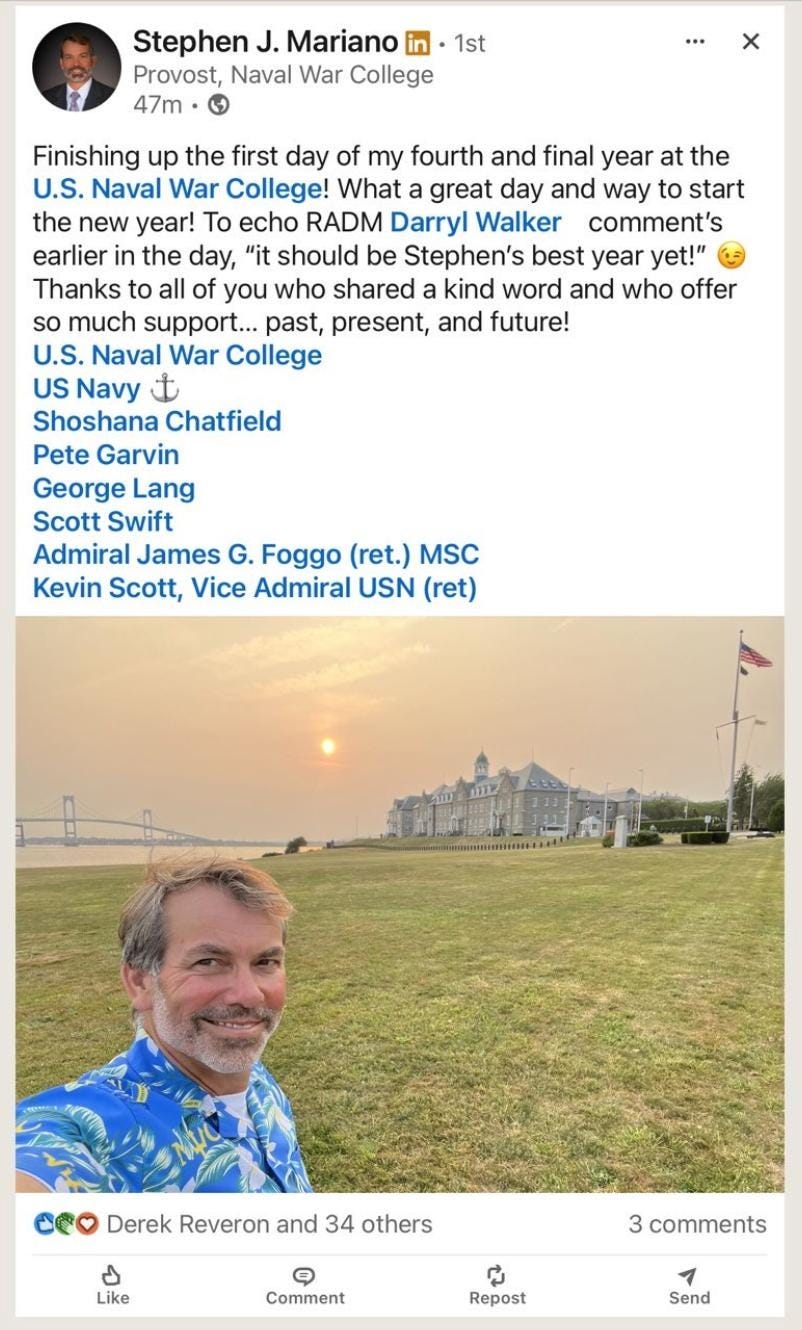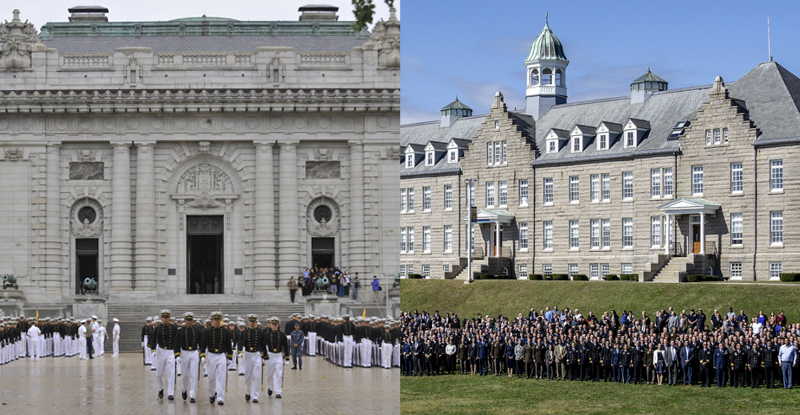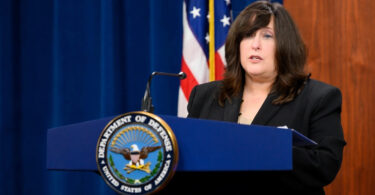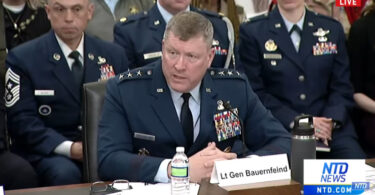By Commander Salamander | His Substack
For those who’ve watched for a long time, especially over the last decade, our service academies and war colleges have drifted further toward academic leftist orthodoxy and away from their core competence as serious military organizations.
The last eight months have been a whirlwind of change, as efforts are finally underway to refocus these institutions on their core competency.
The two most high-profile Navy centers of higher education (with the Naval Postgraduate School a close 3rd, sorry fellas) are the U.S. Naval Academy (USNA) in Annapolis, MD and the Naval War College (NWC) in Newport, RI.
We have covered the need for a depolarization and re-militarization at both institutions here for years, so the latest developments have been welcome with wide, if not patient, smiles.
SECDEF Hegseth and his team at the Pentagon have been leaning forward and more aggressive in this area than I thought I would ever see.
The correction back from Cultural Marxist frameworks such as Critical Theory and the discriminatory diversity industry programs has been swift, and for their true believers and the grifters, shocking.
Some who prospered during the leftist expansion cannot see staying during the correction to center and have resigned, some are still in denial, but the smart ones are burrowing into the ground like cicadas hoping to wait things out and return to the march from Yan’an when conditions permit.
People are policy, so to make substantial changes, you need more than Executive Orders, letters, and memos; you need new people who are not tainted by the politics and policies of the past.
What is the state of play at our two institutions as summer wanes?
We have a new superintendent at the U.S. Naval Academy, Lt. Gen. Michael J. Borgschulte, USMC, but he is just one man leading the same staff and faculty that was dragging USNA to the left.
Questions need to be asked, and people who need to be held accountable, for some of the most egregious actions of the last half decade. It will take until the 26/27 academic year to have real change kick in, but there are things he can do now.
To do that, the new leadership at Annapolis needs to know how the institution got to where it is, and who were the leaders of that drive that are still in positions of power and influence. More of Truth and Reconciliation, less convenient amnesia.
Not everyone needs to be shown the door. Most people involved were just trying to survive—following and implementing legal orders because that’s their job. However, that should not prevent dragging the truth out from under the couch and into the light.
Five questions would get things started:
- Who wrote, staffed, and promoted the program that injected leftist political thought, including Zampolits deployed to the company level, as outlined in 2022’s COMDTMIDNINST 1500.5 “, Diversity Education Program“?
- Who demanded and implemented the Diversity Statement requirements for those applying for positions at Annapolis? Who are the faculty selected during this process? What were the syllabi of the courses they taught in the 2023/24, and 2024/25 academic years?
- Who wrote, staffed, and promoted the injection of Diversity Search Advocates (DSA) in the selection of tenure track faculty in the history and other departments? Who were the DSAs? Where are the records and meetings of all meetings where DSA were involved? Where are the usna.edu email threads from, to, cc, and bcc to or from the DSA concerning faculty positions? Who did they directly report to?
- Who recruited, promoted, and endorsed Ruth Ben-Ghiat to speak at the Bancroft Lecture just prior to the November 2024 election?
- What faculty were specifically hired, or were given greater consideration over other candidates, simply on the basis of their scholarship being infused with gender, race, or Critical Theory?
NWC
Again, change is in the air in Newport, but it is a slower roll. The President, Rear Admiral Walker, USN, has been there a little under a year, but the big sea change will be in a year from now. The Provost in Newport whose tenure has seen…interesting things, has a year left.

One of the topics that the present Provost has been such a strong advocate of has been the Women Peace and Security (WPS) program. Regulars here are very familiar with the topic, but if you are new, you can read this and linked posts to catch up.
Transformation of the WPS concept into an almost unspoofable series of struggle sessions, as I described before, have devolved into little more than butched-up versions of something you might find at Brown University, but with such a hard left ben, that even after the livestreamed wholesale rape in Israel by Gazans on October 7th, 2023, the NWC faculty could not bring themselves to mention this egregious and recent violence against women at war in their own conference ON THAT TOPIC.
The whole exercise is a classic case of institutional capture by the left and a loss of configuration control by leadership.
Institutional culture, even a military one, is not one person. It never is. Problems decades in the making cannot be fixed in one PCS cycle. Instead, there needs to be a deeper review of what a war college is for, what it should focus on, and what, if any, mimicry of civilian institutional habits it should encourage.
As a start, it should be never forget its military foundation.
When you listen to some of the most busy voices, there is a “us v. them” stance by many who still don’t seem to understand they are at a military institution and are there to serve the national defense interests of the Navy and its nation. NWC is not there to serve them and their predilections and unrelated personal ambitions.
To get a feeling of this, let’s spend some time watching the NWC’s All Hands meeting from 11 FEB 2025. You can watch the full meeting at this link, but I want to focus on the second half a bit into the Q&A session at about the 43-minute mark and to the end. It is the last three-quarters of an hour where you can see what I mean about how change and re-centering will not happen overnight.
The President, Rear Admiral Walker, USN, does a good job, all things considered, trying to remind everyone of the military nature of the institution I mentioned two paragraphs above, but I’m not sure it stuck.
I’ve pulled some quotes in order for you to see the very human mindset that is there among some of the faculty. That won’t change overnight.
I’ve uploaded the part I want to focus on to my YouTube channel. The video is posted after the pull quotes, so you can check my transcript for yourself. I will break in now and then with some points of order.
At the end of my pull quotes, you can find the Riverside App generated notes of part of the Q&A session. Yes, it is AI generated…but that is what makes it interesting. What did AI think the second half of the All Hands was about? I didn’t edit anything as I find what computers think…interesting.
Let’s dive in. As this is all open source and published by NWC, I think it is fair to keep the names.
“Hi, Jess Blankshain, National Security Affairs Department. I saw, think, in the senior leader meeting notes about some changes to the faculty handbook in response to executive orders. So I was wondering if you could say a little bit more about those changes and particularly whether any of them will affect the college’s support for the faculty’s academic freedom. Thanks.”
Provost Mariano: “Sure, thank you, Jessica.”
“Yes, I think the easiest part of that was simply some line outs of the language and the executive order that we were prohibited from including. I think between Dr. Gibbons and some members of the faculty, chief of staff and others just found some suitable language that sort of keeps the spirit but also complies with the specifics of the executive order. It is a fair question. And I’ve been in dialogue with the other provosts. We all sort of share the same concerns.”
Note the grudging compliance language. “some suitable language” … “sort of keeps the spirit”. Malicious compliance? Perhaps not. Bureaucratic slow rolling and defining the minimum? No question.
Remember, this is a military institution responding to orders from the Secretary of Defense and the Commander in Chief. Review the Executive Orders yourself.
Note how he pulls his peers in, “We all sort of share the same concerns.”
Really? Define those concerns. I would really like to hear what the other Provosts thought they were talking about.
“I had a call yesterday with the joint provosts. So Marine Corps University or University National Defense University have had one with the Naval Postgraduate School and Naval Academy provost. Last week we’re gonna do another one. Later this week where we’re sharing our concerns and sort of gauging where everybody is at. The service academies are in the news a little bit more than the rest of us. And that’s obviously pretty troubling to our colleagues in Annapolis right now.”
Huh. “Troubling.” Why troubling?
“I don’t think that the handbook changes, I think we’ve done what we need to do. I think there is a bigger conceptual issue. Deans and I talked a little bit about it this morning that we need to address, which is where are we gonna draw those boundaries around the work that all of you are doing and what are we gonna do about it? It’s undetermined space yet. We’re gonna need to be in dialogue with all of you.”
“A couple of issues have come up already where we’re being asked to, you know, remove things off of our web page that if are in violation of some of the executive orders. Our approach has been to comply and sort of save those lectures or articles or whatever they were for later when the policy might change. And if it changes, we can repost them. But for now, we’re in this position of having to be compliant.”
The kind of scholarship he’s talking about is reflected in one of the books listed at the bottom of this post.
“I know the Admiral has shared some concerns or his views on that with the faculty leadership that came in to talk about it. But there’s a little work to do. We’re gonna need your support and have the dialogue on it, figure out the best way forward.”
Admiral Walker: “I completely agree with the provost. You know, and I was telling one of the professors yesterday, I support academic freedom. However, I just also know that we’re all Department of Defense employees, right? We’re for United States government. and they may have issues. We will. I will keep us in the lines of the policy, right? So if there’s a way I can bounce up against the policies and stuff like that to allow us, you all to have, have accesses or we can work, I will work everywhere I can to be within the lines. I am not going to bounce outside of the lines.”
“Okay. Otherwise, you know, it’s just not good for us. It’s not good for the guy. Not good for me because I won’t be here long because it’s kind of like, you know, that’s a self inflicted gunshot wound. But, you know, I will make every effort to support every the policies and keep you keep us as much as give you as much leeway on on each of the executive orders or policy that comes up.”
A very gentle way of hinting that, “Hey, we are a military institution, people.”
Move up to the 20 minute mark. This is a good example of how some of the faculty have lost the plot. Perhaps they have been too long in the single-party Newport or watch nothing but MSNBC at night? Not sure…but yikes.
Marc Genest: “I really appreciate the difficult position that leadership is in right now. So I say this with all due respect. The problem is, I don’t know how an academic can do their job if they are not willing to take controversial issues and write about them or speak about them or teach about them.”
“And one of the things, because I know, how you said the guidelines, the guideposts. I don’t know what they are. And neither do you. But the problem is, as a leader, we have to be told, okay, maybe DEI is out. I’m not going to write about critical race theory or something like that. Fine. But if I have the audacity to say that Canada deserves its sovereignty and write an article about how that undercuts American leadership in the world. Now that is in my area of expertise. And it’s also a very important strategic question. So, I write something like that? Can I have the audacity to say Greenland probably shouldn’t be overthrown by the United States? Or am I?”
“Do I have to self censure myself? Which is by the way, the most dangerous aspect of censorship. It’s not just telling us, okay, this you can’t talk about. It’s then me as an academic saying, am I gonna lose my job if I talk about Greenland?”
“That’s where leadership has to come in. And I’m sorry if it is more difficult for you individually or collectively, but that’s your job. Your job is to support us.”
“And if we feel you are not supporting us, then you’re actually undercutting the mission of the Naval War College.”
Read that bit again. Someone get the good professor some oxygen.
“So I understand your predicament, but this is a time for strong leadership. So I hope you take that in the vein that I mean it, because I understand and I’m very empathetic about your position. But I think you need to be empathetic about our position, particularly as academics. And if you start telling us you can talk about A, C, and E, but nothing else then you’re gonna destroy our intellectual legitimacy.”
You will note that there is a cut between the 22:16 and 22:17 mark. The cut starts right when there is a rising applause. Clearly a few seconds or so have been cut. Is it because of the extended applause? The applause to,
“…you’re actually undercutting the mission of the Naval War College…you need to be empathetic about our position…as academics…you’re gonna destroy our intellectual legitimacy.”
Huh.
NB: the mission statement of the Naval War College:
The mission of the U.S. Naval War College is to educate tomorrow’s leaders, inform today’s decision-makers, and engage with allies and partners on all matters of naval power in order to preserve the peace, respond in crisis, and win decisively in war.
On to pullquote three. At about the 34 minute mark, subtitled, “The Heartbreak of Psoriasis”:
“Mary Thompson-Jones in NSA. I wanted to bring up something about the climate in the classroom. The abolishment of DEI and wokeness and all of that has led to something I’ve not seen before in my time as a professor. Students are a little bit ruder. In the last four weeks, I’ve heard more F-bombs. I actually heard a joke yesterday disparaging Down Syndrome.”
“And my obviously all of us as professors must deal with this as we see it and that’s the most effective way but I also think there’s an easy button here I mean a lot of the questions are a lot harder but my plea to you Admiral and you Provost would be to send out a message with students in mind reminding them that courtesy, civility, DEI, the abolishment of it does not mean the abolishment of courtesy and civility in good manners. And I am sure that there are people who have family members who have Down syndrome or know people in their community who do. And these kinds of things should just, I feel like we’re just sliding down here. So that’s my plea to you. Thank you.”
So, if I get this correctly, the defenestration of official Cultural Marxism has led to a sudden increase in rude behavior and cussing by grown men and women mostly in their 30s and 40s?
Remember, when they say, “students” they are talking about mostly commissioned field grade officers with many years of sea duty, combat tours, etc.
So, that should give everyone a little insight into what I mentioned in the subtitle: people, processes, place, and mindsets.
The Naval Academy and the Naval War College did not devolve into this state overnight, and it won’t be brought back to centerline overnight.
This will require people with drive, vision, persistence, and patience—as those are the characteristics of the leftists who pulled it off centerline since the end of the Cold War.
The good news is that both locations are full of exceptionally qualified professionals and world-class academics who are the envy of the world and want nothing more than to develop the best new cohort of junior officers and to help rising mid-career and senior leaders understand the broader requirements of leadership as their seniority and responsibilities increase.
They are not activists and are not interested in being activists. They just want an open and level field to do their work. We don’t hear from them because that isn’t their skill set or desire…and that is OK.
If you clear away the trendy academic political posturing, careerist signaling to civilian colleagues, or exploitation of the institution for personal political gain, those superior professionals will step up. They’ll build stronger institutions for this century’s challenges.
To wind today’s post up, I am going to paraphrase, in small part, a portion of correspondence I received earlier this year from a very serious and respected academic in the national security arena. This individual challenged, successfully, some of my comments over the last year. In the best of ways, it helped me better understand the perspective from those inside the beast that from the outside, I simply cannot see.
As I listened to the All Hands call, one bit that kept coming to mind is the very serious challenges academics in national security confront—serious concerns—that are structural and directly impact our ability to intellectually address challenges on the world stage.
Those challenges weren’t a priority for those who pulled our institutions to the left.
No.
What was top of mind were socio-political fads independent of national security and the fevered partisan panics of those who have a very narrow intake of information.
They are not focused on what will create a more effective response to existential military threats to the U.S. and her allies—they seem to have other priorities.
A lot of professional academic work and the progress that comes from it comes as a result of grant money. It is hard enough for faculty to attract grant money for what DOD considers important. This pressure can constrain the intellectual pursuits as it is.
People with other agendas trying to blend in DEI, CRT, or whatever The Latest Thing™ is into their limited time, further undermines the larger mission of the institutions they serve as what grants they do get—and the investment of intellectual capital that comes with it—adds little to the enhance the odds of victory by our forces sent to face the enemy.
At the end of the day, that is what it is all about.
This problem of dilution and distraction of the time and intellectual capital of faculty is, I have come to believe, much deeper and worse than I originally thought. For institutions that are focused on Professional Military Education, where is the impact?
Well, watch the video, it speaks for itself.
On the other side of the coin, and in hindsight could be a subject of a post on its own, if you watch the full video, the opening question (40:20 mark in the full video linked in this sentence) that ended right before my clipped video below starts, was actually a very serious and welcome question about the library and archive.
That question is from Sally Paine; a serious question by a serious academic. It is a question that is broad and deep. More of that mindset would be helpful for everyone. Perhaps put her on the short list for the next Provost?
I think that is a long enough post for the day. Here’s the meaty part of the Q&A session quoted above.
AI:
Keywords
academic freedom, executive orders, compliance, digital tools, research challenges, morale, leadership, DEI, intellectual freedom, international programs, classroom conduct, workplace flexibility
Summary
The conversation addresses the recent changes in academic policies due to executive orders, focusing on the implications for academic freedom and compliance. Participants discuss the challenges faced by faculty in maintaining their research and teaching integrity while adhering to new regulations. The dialogue emphasizes the importance of leadership in supporting faculty, the impact of digital tools on administrative processes, and the need for a respectful and civil academic environment. Additionally, the future of diversity, equity, and inclusion (DEI) initiatives is explored, alongside the significance of international programs and workplace flexibility.
Takeaways
- Changes to the faculty handbook were made to comply with executive orders.
- Dialogue among provosts is ongoing to address shared concerns.
- Compliance with executive orders is necessary but challenging for academic freedom.
- Digital tools like docuRouter have improved administrative efficiency.
- Faculty members are facing restrictions on their research topics.
- Morale among faculty is affected by compliance measures.
- Leadership must balance compliance with support for academic values.
- The future of DEI initiatives remains uncertain under current policies.
- Classroom conduct and civility are critical issues to address.
- Workplace flexibility is being prioritized to support faculty needs.
Titles
- Navigating Academic Freedom in Changing Times
- Compliance and Its Impact on Faculty
Sound bites
- “I support academic freedom.”
- “We need to figure out how to comply.”
- “We need to brace for change.”
Chapters
00:00: Navigating Changes in Academic Freedom
09:53: Compliance and Its Implications for Research
19:47: Balancing Institutional Policies and Academic Integrity
25:33: Navigating Compliance and Inclusivity Challenges
26:52: Addressing Diversity, Equity, and Inclusion Concerns
28:25 Understanding the Impact of Cultural Respect
30:42 The Importance of International Programs
32:29 Supporting Civilian Students Amid Organizational Changes
33:39 Maintaining Civility in the Classroom
38:36 Flexibility in Work Schedules and Telework Policies
First published on Commander Salamander’s Substack








Leave a Comment